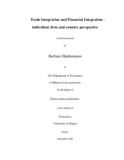Citation link:
https://nbn-resolving.org/urn:nbn:de:hbz:467-4548Files in This Item:
| File | Description | Size | Format | |
|---|---|---|---|---|
| haeussermann.pdf | 646.42 kB | Adobe PDF |  View/Open |
| Dokument Type: | Doctoral Thesis | metadata.dc.title: | Trade integration and financial integration : individual, firm and country perspective Handelsintegration und Finanzintegration : Individual-, Firmen- und Länderperspektive |
Authors: | Häußermann, Barbara | Institute: | Fachbereich 5, Wirtschaftswissenschaften, Wirtschaftsinformatik und Wirtschaftsrecht | Free keywords: | Handelsintegration, Finanzmarktintegration, FDI, Risikodiversifizierung, Trade, Financial Markets, Riskdiversification | Dewey Decimal Classification: | 330 Wirtschaft | GHBS-Clases: | PRQ | Issue Date: | 2008 | Publish Date: | 2010 | Abstract: | Die zunehmende Globalisierung der Märkte, unter anderem durch ansteigenden Handel von Güter und Dienstleisungen und damit einhergehenden Zunahme von ausländischen Investitionen ist eine der größten Triebkräfte der wirtschaftlichen Entwicklung. Dies gilt für Industrieländer als auch für Entwicklungs- und Schwellenländer. Diese voranschreitenden integrativen Entwicklungen bergen jedoch neben zahlreichen positiven Effekten Risiken für die beteiligten Länder. Erhöhte Arbeitsteilung und Konkurrenz sowie Verbreitung von ökonomischen Schocks über Ländergrenzen hinweg, können zu erhöhter Unsicherheit und veränderten Marktbedingungen führen. Diese Risiken können wiederum durch die zusätzlichen Instrumente der liberalisierten Kapitalmärkte zur Risikostreuung und -minderung abgefedert und vermindert werden. Globalisation consists of many small components and every component entails different effects. The main part of globalisation is international integration of goods, service, financial and factor markets. This integration is accompanied by international trade in goods, services and finance. According to the WTO Trade Report (2008), the increase in international trade exceeded the growth in global output in the year 2007 by 2 percentage points. A further prominent aspect of globalisation is the increase and composition of international capital flows. Foreign direct investment increased during the 1990s by more than 20 % and thereby exceeded international portfolio flows (WTO 2008). Both integration processes have lead to more efficient allocation of economic resources and greater levels of output. However, an additional result of the international trade integration is higher uncertainty due to intensified production specialization, increased competition and economic cross-country spillovers. Various groups of individuals such as workers, firm owners and political leaders are differently affected by these risks. Yet, financial integration offers the possibility to diversify these new arising risks. Again, the affected groups benefit differently from these diversification possibilities. Generally, the present work analyses the diverse impact of international integration on workers, firm owners and on country patterns. In particular, the consequences of proceeding international integration on risk sharing for the respective groups are emphasized. |
URN: | urn:nbn:de:hbz:467-4548 | URI: | https://dspace.ub.uni-siegen.de/handle/ubsi/454 | License: | https://dspace.ub.uni-siegen.de/static/license.txt |
| Appears in Collections: | Hochschulschriften |
This item is protected by original copyright |
Page view(s)
452
checked on Nov 25, 2024
Download(s)
75
checked on Nov 25, 2024
Google ScholarTM
Check
Items in DSpace are protected by copyright, with all rights reserved, unless otherwise indicated.

